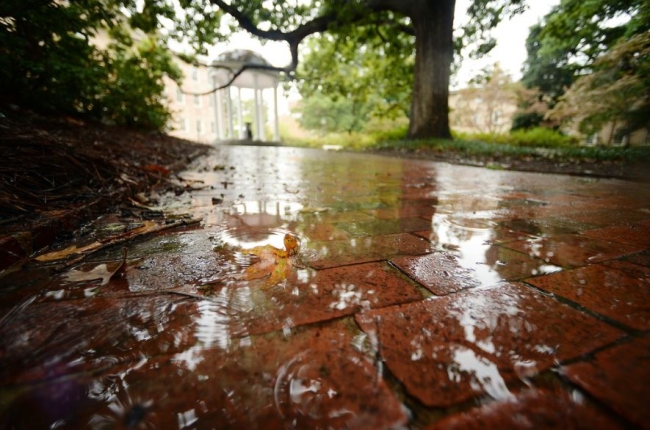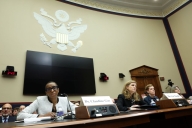You have /5 articles left.
Sign up for a free account or log in.

Legislators' creation of a new collaboratory at UNC Chapel Hill charged with looking at environmental policy is creating controversy.
UNC Chapel Hill
A new environmental public policy laboratory being set up at the behest of state lawmakers at the University of North Carolina at Chapel Hill is drawing protests from some faculty members worried about academic freedom and institutional autonomy.
Campus administrators say the laboratory, called the North Carolina Policy Collaboratory, can help address complex environmental questions cutting across science and public policy. And some faculty members are cautiously optimistic that it could fill a research void.
But others say the way the collaboratory was established -- through a piece of legislation -- makes it a potential political pawn and an example of overreach by lawmakers who have proven too willing to overstep their authority by meddling with the state's public universities.
The collaboratory was written into North Carolina’s budget, which Governor Pat McCrory signed in July, shortly after lawmakers passed it. The budget bill provides millions of dollars to be used to establish the collaboratory, described as an entity that “facilitates the dissemination of the policy and research expertise of the University of North Carolina for practical use by state and local government.” The bill goes on to outline collaboratory duties, including researching natural resource management and new technology to improve habitats, the environment and water quality. The bill calls for the collaboratory to develop and share best practices with parties including the North Carolina Legislature.
That has some sounding alarm bells about potential political implications and university governance issues. Legislative establishment of the collaboratory could violate both state law and UNC’s Code of Governance, said Stephen Leonard, a professor of political science at Chapel Hill and the past chairman of the UNC system’s Faculty Assembly.
“One of the problems is that the UNC code requires these things to come from the faculty up,” he said. “There’s a whole process of planning and approval that has to be followed, and that planning and approval is very detailed.”
Leonard has heard mutterings about the possibility of faculty members bringing a lawsuit over the collaboratory’s creation. The premise of the suit would be that state law does not allow the Legislature to make appropriations for individual campuses. Regardless of whether a suit is brought, issues that need to be addressed are who came up with the idea for the collaboratory and whether any system rules or state laws were violated, Leonard said.
The bill calling for the collaboratory’s establishment allots $1 million in recurring funds for establishment and operation. It also offers up to $3.5 million in nonrecurring state funds for 2016-17 -- but those funds are a dollar-for-dollar fund-raising match, meaning the university would have to raise $3.5 million by the end of June to receive the full allotment.
Leonard wondered about the conditions under which the new money is being spent. Lawmakers are putting money toward a new project after the UNC system decided to close several university-based centers last year, including, controversially, the Center on Poverty, Work and Opportunity at Chapel Hill, led by the politically outspoken law professor Gene Nichol. That decision followed legislative direction to consider redirecting money away from centers toward other priorities.
Requests for comment from North Carolina’s Senate president pro tempore, Republican Phil Berger, were not returned Friday. A report indicated Berger’s science and technology adviser, Jeff Warren, is a potential director for the center. Warren is known for helping to write controversial 2012 legislation barring North Carolina from basing coastal policies on scientific predictions of sea level rise.
A North Carolina Department of Environmental Quality spokeswoman provided a statement saying the state agency was not involved in planning the collaboratory but that it looked forward to seeing its work. A North Carolina system spokeswoman said in an email that she was aware of the appropriation for the collaboratory but had no information beyond what was included in the state budget language.
Administrators in Chapel Hill said many of the collaboratory’s key details, including staffing, are still being determined. But they argued the collaboratory will be free of political influences, even though it deals with the often tricky and charged topic of the environment. Water quality rules in particular are an issue in North Carolina at the moment.
The collaboratory will do scientific work, said Brad Ives, UNC associate vice chancellor for campus enterprises and chief sustainability officer at Chapel Hill. But it will be dealing with issues that also touch public policy and economics, he said.
“Lots of different issues are going to be challenging, but we think the University of North Carolina is uniquely situated to tackle these,” said Ives, who is a former assistant secretary for natural resources with the state Department of Environment and Natural Resources, which has since been renamed the Department of Environmental Quality.
“We’ve got schools of government,” Ives said. “We have environmental scientists. We work on public policy issues all the time. We have a law school. This is what we’re supposed to do, and I think the Legislature recognizes that and has given us the financial resources to go do it.”
The collaboratory is being set up under Ives’s office. But he has not coordinated with legislators on the new organization, he said -- he only learned it was called for in budget drafts in late May.
“Let me just go on the record with the fact that no one at the state Legislature communicated to me, or to my knowledge anyone else, expectations about what research would be done outside of what was specified,” he said. “There have definitely been no communications about expectations of results from any of the research.”
Some research projects will have the collaboratory funding work at Chapel Hill. It’s also possible that it could turn to other universities or even the private sector for expertise, said James W. Dean Jr., executive vice chancellor and provost at Chapel Hill.
But collaboratory research will follow the same standards and processes as any other work at the university, Dean said.
“I feel very comfortable that we have all of the processes in place, both in general and in what we will be putting in place for this particular research,” he said. “It’s going to be the same as any research we do. There’s not going to be anything special or different or unusual about the research procedures.”
Faculty response has not been uniformly negative. Growth and change in public universities is going to lead to some unique organizational models, said Bruce Cairns, a professor of surgery and the director of the North Carolina Jaycee Burn Center, who is faculty chairman at Chapel Hill. The collaboratory would not be the first time the university has tried a new model, Cairns said.
“I would agree that this is novel,” Cairns said. “I think if implemented properly, it can represent some opportunities. Of course, like all initiatives, we have to monitor this closely.”
The collaboratory appears to have a mission to cover topics beyond the expertise of any one single unit on campus, according to Michael D. Aitken, a professor in the department of environmental sciences and engineering and the department’s former chair.
“I would be OK with this thing being set up outside an academic unit, as long as there’s some faculty oversight and accountability built into its structure,” he said in an email. “Perception is important too, so transparency should be a guiding principle. And it does seem to be consistent with the university’s mission of serving the state.”
At least some environmental advocates are wary but believe the new collaboratory has at least some potential benefits. Coastal Review Online quoted Steve Tedder, a member of North Carolina’s environmental management commission, as saying the collaboratory could have positives if researchers are independent.
“I hope they don’t have to work under something where there’s a controlled message,” the publication quoted Tedder as saying.
Yet for others, the way the collaboratory was created is all too reminiscent of recent fights over lawmakers trying to control the North Carolina state system. This year’s budget included a controversial push to drop in-state tuition to $500 per semester at several state institutions. The proposal drew protests in part because it originally would have covered three public historically black institutions, raising concerns it targeted those institutions.
A version of the $500 tuition plan that passed will affect Elizabeth City State University, UNC Pembroke and Western Carolina University starting in 2018. One of those, Elizabeth City State, is a historically black university. Other legislative actions rankling some on campuses include a tuition freeze and fee cap.
“It’s just incredible overreach,” said Leonard, the UNC system Faculty Assembly past chairman. “This is such imperious and haughty behavior. It’s stunning.”








